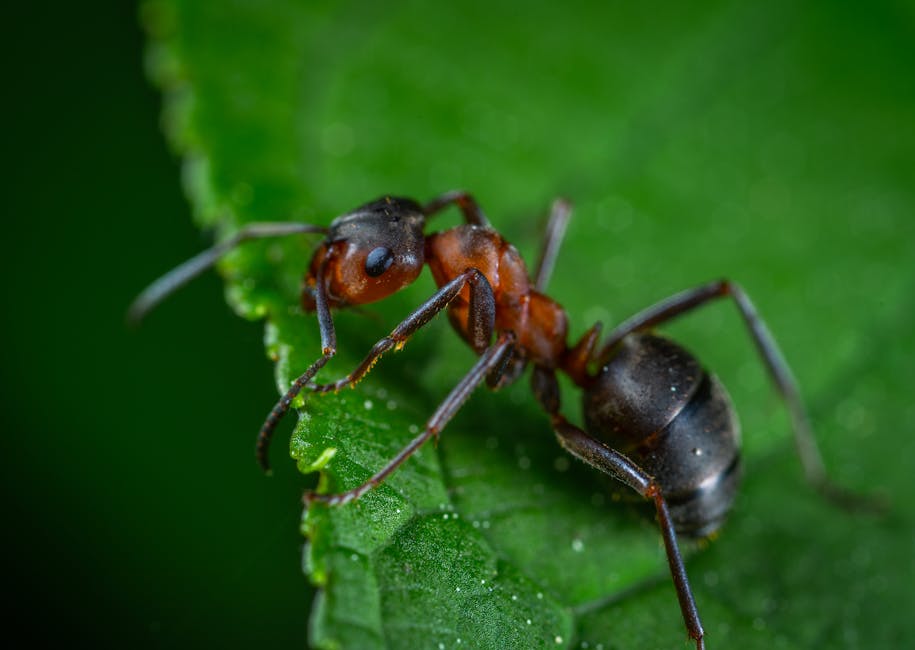Understanding Ant Infestations
When dealing with ant infestations, it’s important to identify the type of ants invading your space. Common household ants, like carpenter ants or odorous house ants, each require different approaches for effective elimination. Knowing the species will help you choose the most suitable method to get rid of them.
Natural Ant Extermination Methods
Natural ant extermination methods are a safer option as they do not involve harmful chemicals. Some effective natural methods to get rid of ants include vinegar, cinnamon, peppermint oil, and bay leaves. These natural remedies work by disrupting ants’ communication trails and deterring them from entering your home. Additionally, keeping surfaces clean, food sealed, and eliminating entry points can help prevent ant infestations.
Chemical Ant Extermination Methods
Chemical ant extermination methods are commonly used to quickly eradicate ant infestations. These methods usually involve using powerful insecticides that target and eliminate ants on contact. It is important to follow the instructions carefully when using chemical ant extermination products to ensure effectiveness and safety. Chemical ant baits and sprays are popular options for homeowners dealing with ant problems. When using chemical ant extermination methods, it’s crucial to keep pets and children away from treated areas to prevent accidental exposure.
Pros and Cons of Natural Approaches
Natural approaches for ant extermination are environmentally-friendly and safe for pets and children. However, they may require more frequent application than chemical methods. Natural solutions can also be less effective in completely eliminating ant colonies compared to chemical treatments.
Pros and Cons of Chemical Approaches
Chemical approaches for ant extermination are effective in quickly eliminating ant infestations. Pros include:
- Fast results: Chemicals can eradicate ants swiftly.
- Widespread coverage: Chemicals can reach ant nests that are difficult to access.
- Long-lasting effects: Chemicals can provide extended protection against future infestations.
However, there are also cons to consider:
- Health concerns: Chemicals may pose risks to humans and pets.
- Environmental impact: Chemicals can harm beneficial insects and plants.
- Cost: Professional application of chemical treatments can be pricey.
Safety Considerations for Natural Methods
Natural methods for ant extermination are generally safer for pets, children, and the environment compared to chemical approaches. Here are some safety considerations if you opt for natural methods:
- Non-toxic ingredients: Ensure the ingredients used are safe and non-toxic to avoid harm to pets or children.
- Ventilation: Maintain good ventilation when using natural repellents to prevent inhaling any strong scents that may cause discomfort.
- Effectiveness: Natural methods may require more frequent application than chemical ones, so consider the time and effort needed for successful ant control.
Safety Considerations for Chemical Methods
When using chemical methods for ant extermination, it’s crucial to prioritize safety. Ensure to read and follow all instructions on the product label. Keep children and pets away from treated areas to prevent accidental exposure. Wear protective gear like gloves and a mask when handling chemical ant killers. Ventilate the area well to disperse fumes. If you hire a professional exterminator, ask about the chemicals they use and any potential risks associated with them.
Effectiveness of Natural vs. Chemical Approaches
Natural approaches for ant extermination are typically less effective than chemical methods. Chemical approaches tend to provide quicker and more thorough results in getting rid of ants. Natural methods, such as using vinegar or essential oils, might work for small ant invasions, but they may not be as effective for larger infestations. Chemical treatments, like ant baits or sprays, can eliminate ants more efficiently and effectively in most cases. However, it’s essential to consider the safety of pets, children, and the environment when choosing between natural and chemical approaches for ant extermination.
Combining Natural and Chemical Methods
Using a combination of natural and chemical methods for ant extermination can be a highly effective approach. Natural methods such as using vinegar, lemon juice, or cinnamon can deter ants and disrupt their scent trails. On the other hand, chemical methods like ant baits or insecticidal sprays can target ant colonies more directly. By combining the two approaches, you can create a comprehensive strategy to eliminate ants from your home more efficiently.
Conclusion: Choosing the Right Approach
In the end, the choice between natural and chemical approaches for ant extermination boils down to personal preference and the level of infestation you are dealing with. Here are a few key points to consider before making your decision:
-
Natural Approaches:
-
Environmentally friendly
-
Safer for pets and children
-
May require more frequent applications
-
Chemical Approaches:
-
Stronger and more immediate results
-
Potentially harmful to the environment and health
-
Typically longer-lasting effects
Ultimately, weigh the pros and cons of each method according to your situation, values, and the severity of the ant problem.




